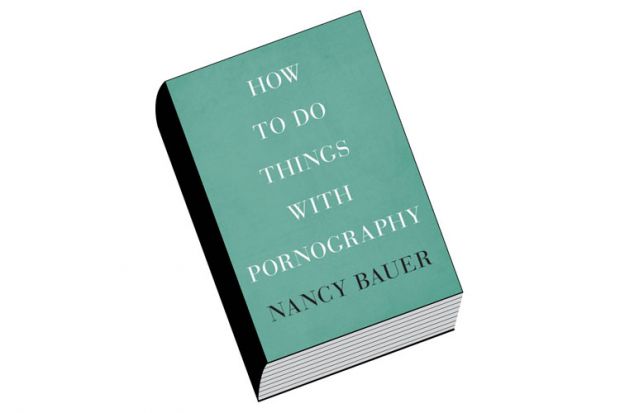For philosophers, the play on J. L. Austin’s How to Do Things with Words in the title of Nancy Bauer’s book will be immediately obvious. Other readers might be surprised – frustrated even – that the “things” one might “do” with pornography are largely absent from this account.
Even so, How to Do Things with Pornography is refreshingly accessible to the non-philosopher – in which camp I include myself. It productively places Bauer’s blogs from The New York Times alongside more extended academic pieces in offering a route through complex debates for the non-specialist. At its heart is an interrogation of contemporary practices of philosophy and the real-world relevance of the discipline. Although Bauer’s analysis is discipline-specific, for those of us mired in debates about research impact there are broader points of connection. This tension between thinking and doing (and thinking as doing) is, for Bauer, the “contradiction in terms” at the heart of feminist philosophy. Pornography provides a lens through which to explore these tensions.
Austin, and misuses of his work, provides a thread linking the essays in this book. For American anti-pornography feminists – who have long argued against conceptualisations of pornography as (protected) speech to define porn by what it does – Austin has held a particular attraction. But, for Bauer – drawing on Stanley Cavell – this has, among other things, resulted in an over-simplification of the representational practices of porn. In its most widely consumed forms, porn is rarely “only words”.
Bauer’s engagements with the work of scholars Catharine MacKinnon and Rae Langton are the most intellectually rewarding sections of the book. But they are also the most frustrating, as Bauer’s generalisations about anti-porn feminism are decades out of date. While she is correct that there are many continuities between the anti-pornography feminism of today and the foundational arguments of the 1980s, her lack of awareness of contemporary scholarship is jarring. To argue, for instance, that “antipornography arguments…ordinarily do not even mention, let alone take seriously, the sea change that the development of the internet has wrought” is simply untrue. Given Bauer’s aim of thinking about how feminist philosophy can(not) be useful in broader political debates, these inaccuracies matter.
In many ways, this reads like a much older book, occasional references to hook-up culture and Lady Gaga aside. For example, reflecting on the 1986 report by the Meese Commission (an investigation into pornography ordered by US president Ronald Reagan and led by the attorney general) and Andrea Dworkin’s foundational 1981 work Pornography: Men Possessing Women, Bauer asks how critics can write about pornographic representations without reproducing them. She goes on to claim that an honest accounting of “our” investments in porn requires “looking at a lot of pornography, if one hasn’t already, and looking differently at a lot of pornography, if one has”.
I agree that writing, critically, about pornography presents a difficult ethical question. I also agree that detailed textual analysis of pornography can be incredibly productive in thinking through investments in porn – although it is hardly the only method for doing so, nor is it a new one. What irks is that Bauer seems unaware of vast swathes of contemporary scholarship that attempt to do exactly what she asks for here.
As this suggests, Bauer uses pornography as a catalyst for thinking about philosophical thinking and its place in the world, rather than as a point of analysis in itself. Indeed, there is very little about pornography here. When Bauer does home in on specific examples, they are as likely to be of contemporary sexual mores (hook-up culture and young women’s investments in it), or mainstream popular culture (Lady Gaga) as they are to be of pornographic texts. These analyses have much to offer, and put Simone de Beauvoir to good use in constructing a timely and provocative account of self-objectification. However, their relationship to “pornography” is unclear.
Ironically in a book that is centrally concerned with how others define pornography, Bauer herself uses the term very loosely. This may be less of a problem if this book is judged as a discipline-specific intervention, for Bauer is more interested in the philosophical life of pornography than in what its users – or critics – “do” with it. Judged on these terms, this is likely to be a far more significant text. How to Do Things with Philosophy, perhaps?
Karen Boyle is professor of feminist media studies, University of Stirling, and editor of Everyday Pornography (2010).
How to Do Things with Pornography
By Nancy Bauer
Harvard University Press, 232pp, £25.95
ISBN 9780674055209
Published 30 April 2015
Register to continue
Why register?
- Registration is free and only takes a moment
- Once registered, you can read 3 articles a month
- Sign up for our newsletter
Subscribe
Or subscribe for unlimited access to:
- Unlimited access to news, views, insights & reviews
- Digital editions
- Digital access to THE’s university and college rankings analysis
Already registered or a current subscriber?
